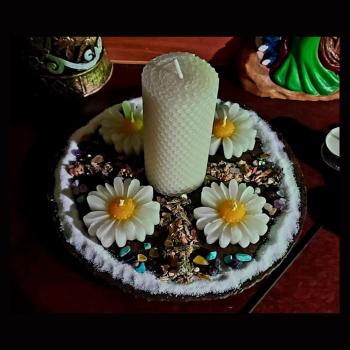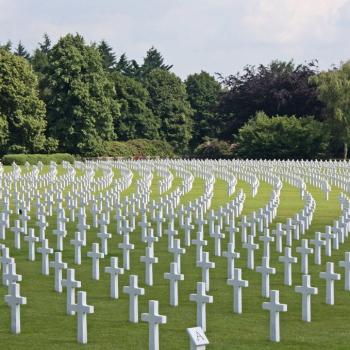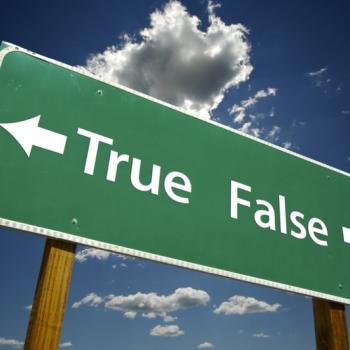Anyone in the ancient world would have understood the original version clearly: We need bread for today. Very clear. Then, what would have to come next in such a prayer was: No debt for tomorrow. Those were the two peasant nightmares: finding bread for today and getting out of debt tomorrow.
When that term is translated into "trespasses," then we're sliding into some kind of spiritualized, confusing interpretation of the prayer. The English word "trespasses" is terribly confusing. What does that word mean? Probably something about crossing a farmer's field or maybe sneaking into a gated community. We see that word mainly on signs: "No trespassing." Pretty soon, we can end up with a section of the prayer that's close to meaningless for modern people.
We all hate debt, these days. But you point out that debt is bigger than just owing money. In the biblical understanding of debt, this is a direct pathway toward slavery, right?
Yes, the Bible always puts debt and slavery together. Remember, the Bible originally was speaking to people who were mostly small farmers. That's the focus of the Torah. The big question was: How do we live together and protect the family farm? At that time, people were sold into slavery over debts. Sometimes people sold themselves into slavery over a debt.
In our world at the moment, I think we may be coming to see this problem in new ways. Think about the mortgage meltdown we just went through. There are people now who owe more on their houses than the houses are worth. They'll never be able to get out of debt. Is this a new way of enslaving people?
Today, how does one country take over another country? We don't send in an army anymore, for the most part. No, that's a crude, old-fashioned way to control other countries. Now, we enslave other countries by controlling their economies.
You're careful to explain in the book that your interpretation of the prayer is built, reference by reference, from the biblical record itself. This isn't a case of Dom Crossan stepping into the prayer and taking it in some strange Socialist direction, for example.
Right. I've heard people say, "Oh, this is just liberalism of the worst sort!" Or, "You're just putting Socialism into the Lord's Prayer!"
So, I wanted to come up with my own term to describe this meaning within the prayer that won't confuse people with those other political arguments. I might have said that the prayer is calling for "egalitarianism," but that's not right. It's not accurate. Good households aren't run on egalitarianism and that's even not the issue in this particular prayer. We're not calling for everyone to have exactly the same. That doesn't work and it isn't fair. If a child becomes seriously ill, we all agree that child should get extra care. If a woman becomes pregnant, we all agree that she should be able to get all she needs during her pregnancy.
We're not talking about giving every single person exactly the same thing. We're talking about people having enough, and that's not a precise term and it shouldn't be a precise term. Enough will vary, but that's the goal -- enough to meet our daily needs and to avoid crushing debt tomorrow. So, I call that "Enoughism." The Lord's Prayer calls for Enoughism.
Finally, you make it very clear in the book that we are talking about a prayer here. We're talking about a spiritual experience of invoking the Spirit of God, not merely taking some kind of good-hearted civic pledge. I really like the sections of your book in which you try to describe the idea of God's Spirit praying with us -- even praying from within us. I think readers are really going to enjoy thinking about and discussing those sections of your book.
Right. I do get terribly nervous when people start arguing that I'm somehow trying to push politics -- that I'm ignoring religion. That's a notion alien to the Bible. What the Bible is interested in is the question: Who owns the world? And if God owns the world, then how is it to be run?
A phrase like "Kingdom of God" is not comfortable contemporary language for us, but the phrase does push us to raise questions like: What would it look like if God drew up a budget for the whole world next year? What would that budget look like?
You write in the book about the many ways that we as humans create our own problems in God's Household. When we allow such horrific inequalities to exist -- including areas of the world where infants and their mothers die at shocking rates, for example -- then we shouldn't be surprised that there are rising tensions in the global community.
I like to talk about building a boat. If you build a boat but you don't seal it properly, then you take that boat out to sea -- you're going to sink. Well, when that happens, don't blame the boat. Don't blame the sea. We didn't build the boat correctly in the first place. The same thing is true of the world. If we don't build the world correctly, there will be problems. A God of Justice created this world and this boat won't sail right if we forget the importance of justice.




